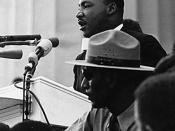"The overthrow of an existing government, ... the installation of traffic-calming measures in a suburban street" (Abercrombie, 2000: 324), the nuclear disarmament movement, the stop the war coalition, all are examples of social movements. A social movement, as defined by Tarrow (1994: 4), is 'collective challenges by people with common purposes and solidarity in sustained interaction with elites, opponents and authorities'. This shows that social movements tend to try and bring about change by challenging those above them whether it is the local council, the government or large corporations. We've seen this most recently with the huge protests across the world aimed at world leaders to stop the war in Iraq with 'upwards of 1.5 million on the streets of London' (Whitely, 2003) and elsewhere to try and challenge and change respective governments' positions on the war in Iraq and the war on terrorism. We see social movements differ from interest groups and political parties because "they have mass mobilisation or threat of mass mobilisation" (Marsh, 2000: 251).
A social movement is also distinguished from other collective groups such as clubs and voluntary organisations "in being chiefly concerned to defend or change society or the relative position of the group in society" (Marsh, 2000: 251), whereas clubs etc. aren't concerned, generally, in these large-scale issues. For this essay I will be concentrating on modern social movements from around the 1950s/60s onwards and will be using examples of different social movements e.g. Animal Rights movements, Civil Rights movements, Anti-globalisation movements etc... to try and show why some social movements have succeeded in their aims and why some have failed in their actions. I will examine factors such as the relationships between people within movements (the ecology), the makeup of the group (gender and class etc...), the ideology of the movement,


